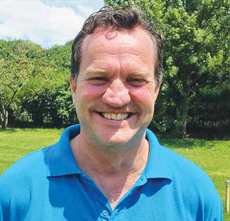 Hamish Ker has been appointed as Andermatt Kenya’s Chief Executive Officer, effective 1st December 2023. “We have an opportunity to help our customers meet the demands of biological solutions and we are excited to welcome Hamish to the team!” the Andermatt team says.
Hamish Ker has been appointed as Andermatt Kenya’s Chief Executive Officer, effective 1st December 2023. “We have an opportunity to help our customers meet the demands of biological solutions and we are excited to welcome Hamish to the team!” the Andermatt team says.
“We want to thank Stephen Musyoka, who has been instrumental in establishing Andermatt Kenya as a going concern since inception these past four years – as an early adopter and pioneer of biological farming solutions in Kenya.”
“Stephen has assisted in positioning Andermatt business for future growth/ development in 2024 and beyond. We are grateful for Stephen’s contributions to Andermatt and the impact we created together over the last four years. Stephen will take up a new role within the company as General Manager, Macrobial business. With the development of the Andermatt footprint in Kenya and the continued investment in our macrobial production capacity we are confident of the growing role Andermatt must play in the rapidly growing demand for Healthy Food and Healthy Environment for all!”
Andermatt’s Journey in Africa
Healthy Food and Healthy Environment for all, speaks directly to Africa and her people.
Andermatt’s vision in Africa is focused on feeding the continent sustainably, as well as strengthening local economies through the export of high-quality, residue-free, healthy food.
South African based Andermatt Madumbi and Andermatt PHP, are recognised as well established, market leaders in the distribution and manufacture of quality biological solutions.

 The first half of 2023 witnessed a series of pivotal moments that set the course for the future of Africa’s fresh produce export sector. From innovative freight solutions to lifting existing bans, the industry experienced significant events that had a lasting impact on its growth and performance in the years ahead.
The first half of 2023 witnessed a series of pivotal moments that set the course for the future of Africa’s fresh produce export sector. From innovative freight solutions to lifting existing bans, the industry experienced significant events that had a lasting impact on its growth and performance in the years ahead.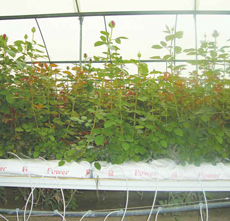 Floriculture, has evolved significantly in recent years with the emergence of two distinct approaches: hydroponic and substrate-based systems. These methods offer unique advantages and require specialized nutrition management strategies to ensure the healthy growth and vibrant blooms of flowers. Hydroponic floriculture relies on a soilless environment, with essential nutrients delivered through precisely balanced nutrient solutions, while substratebased floriculture employs solid, soilless substrates supplemented with additional nutrients.
Floriculture, has evolved significantly in recent years with the emergence of two distinct approaches: hydroponic and substrate-based systems. These methods offer unique advantages and require specialized nutrition management strategies to ensure the healthy growth and vibrant blooms of flowers. Hydroponic floriculture relies on a soilless environment, with essential nutrients delivered through precisely balanced nutrient solutions, while substratebased floriculture employs solid, soilless substrates supplemented with additional nutrients.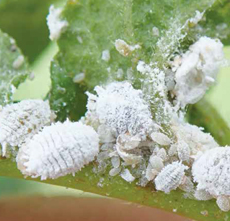 Cut flower cultivation is an art that demands meticulous care and attention to detail. Whether you are a professional floriculturist or an avid hobbyist, the joy of cultivating vibrant, blooming flowers is unparalleled. However, like any other form of agriculture, cut flower growing comes with its own set of challenges, and one persistent problem that often plagues flower growers is the infestation of mealybugs.
Cut flower cultivation is an art that demands meticulous care and attention to detail. Whether you are a professional floriculturist or an avid hobbyist, the joy of cultivating vibrant, blooming flowers is unparalleled. However, like any other form of agriculture, cut flower growing comes with its own set of challenges, and one persistent problem that often plagues flower growers is the infestation of mealybugs. Welcome to the exciting financial journey of 2024! It’s a ride full of possibilities for savvy investors like you. Picture this: smart investing in 2024 goes beyond the usual. We’re talking artificial intelligence, blockchain, and more! This guide is your ticket to manoeuvring through the financial twists and turns.
Welcome to the exciting financial journey of 2024! It’s a ride full of possibilities for savvy investors like you. Picture this: smart investing in 2024 goes beyond the usual. We’re talking artificial intelligence, blockchain, and more! This guide is your ticket to manoeuvring through the financial twists and turns.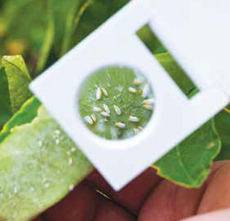
 By Mary Mwende
By Mary Mwende Geraldine Woessner, one of the three journalists targeted by Séralini, announced on X/Twitter: “I am pleased to announce that jurisprudence has FINALLY changed: in the defamation case brought against me by Gilles-Eric Séralini, for having referred to his 2012 study on GMO-fed rats as ‘fraudulent,’ the court has just ruled in my favor. Have a great day!” She added: “My colleagues @MacLesggy and Patrick Cohen, who was also being pursued, have been acquitted.”
Geraldine Woessner, one of the three journalists targeted by Séralini, announced on X/Twitter: “I am pleased to announce that jurisprudence has FINALLY changed: in the defamation case brought against me by Gilles-Eric Séralini, for having referred to his 2012 study on GMO-fed rats as ‘fraudulent,’ the court has just ruled in my favor. Have a great day!” She added: “My colleagues @MacLesggy and Patrick Cohen, who was also being pursued, have been acquitted.”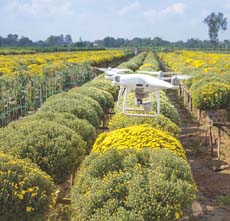 Precision Agriculture Meets Flower Farming Flower farming, like other agricultural sectors, is experiencing a transformative shift towards data-driven scouting. This approach harnesses the power of technology and data analysis to optimize various aspects of flower cultivation.
Precision Agriculture Meets Flower Farming Flower farming, like other agricultural sectors, is experiencing a transformative shift towards data-driven scouting. This approach harnesses the power of technology and data analysis to optimize various aspects of flower cultivation.